Parrots are a popular pet for many people around the world. They come in a variety of sizes, shapes and colors, can talk, mimic sounds and even learn tricks! Here are 60 plus facts about parrots as pets that may surprise you.
9 amazing facts about parrots
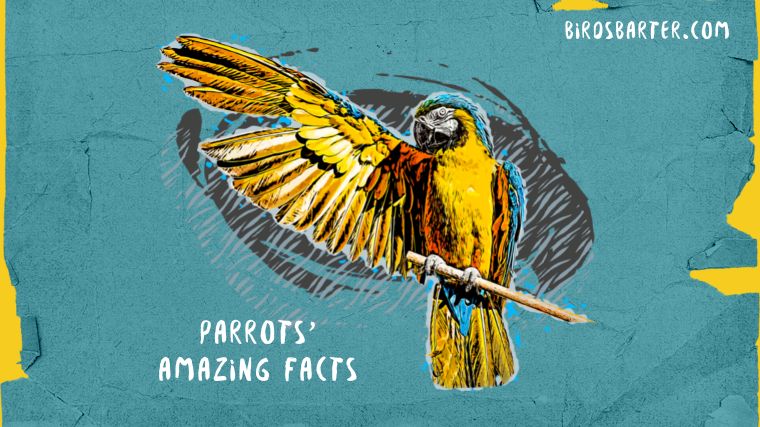
- The largest parrot is the Hyacinth Macaw which can reach up to 3 feet tall! The smallest parrot is the Buff-faced Pygmy Parrot which grows to only 4 inches in length.
- Parrots have a “toe” called a zygodactyl which allows them to cling onto things with two toes pointing forwards, and two pointing backwards.
- Parrots have a highly developed sense of vision and can recognize colors, shapes and even people they know!
- Parrots are social creatures and require daily interaction with their owners in order to stay content and healthy.
- Parrots are omnivores which means they eat both plants (fruits and vegetables) and meat (seeds and insects).
- Parrots need a lot of space to spread their wings, so make sure you have an appropriate sized cage for your pet!
- Parrots can be very loud in the morning or evening.
- Parrots are long-lived creatures, with some species living up to 70 to 80 years in captivity! So be sure you’re ready for a long-term commitment before getting a pet parrot. By understanding the needs of your feathered friend, you can create an enjoyable environment that will help keep your parrot content and healthy for many years to come!
- Parrots are noisy, and they love to vocalize throughout the day. This can disturb neighbors and other family members. Be sure to find out if local laws limit how loud your parrot can be.
See also: All about Quaker parrots
16 interesting and fun facts about parrots
Looking for some fun facts about parrots?
Let’s find out here:
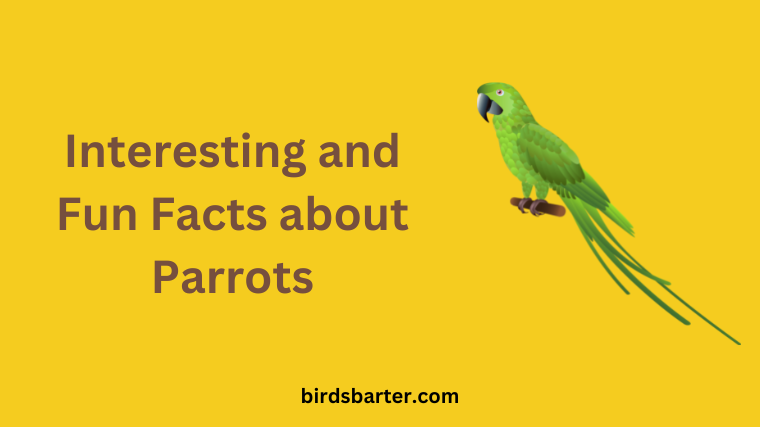
Here are some interesting facts you want to learn about parrots.
- Parrots can live for up to 80 years. They make great long-term companions!
- Parrots have the intelligence of a three-year-old human child!
- Many parrot species are considered endangered in their natural habitats.
- Parrots come from all over the world – from Africa, Central and South America, to Australia.
- Parrots need regular visits to an avian veterinarian for check-ups and preventive care.
- Parrots can be taught to perform tricks and tasks, such as giving a high-five or retrieving objects.
- Parrots are highly social creatures and should not be kept alone – they thrive when in the company of other parrots or their owners.
- Feeding your parrot, a variety of nutritious foods is essential for their health, including fresh fruits, vegetables and quality birdseed mixes.
- Parrots require plenty of space for climbing, playing and exploring– cages should be spacious enough for them to move around without feeling confined or crowded!
- Parrots need toys and activities to stay entertained, such as foraging boxes, swings, ladders and chewable items like bird-safe wood blocks.
- Parrots require frequent grooming to keep their feathers healthy and clean – regular showers or misting with warm water can help to keep them happy and clean!
- As inquisitive creatures, parrots often try to escape enclosures – it’s important to always supervise them so that they don’t get into any trouble.
- Parrots should be trained using positive reinforcement techniques – they respond best to rewards, such as treats and praise, rather than punishment or scolding.
- Parrots are very social animals and need to be around people or other parrots often.
- Parrots are sensitive to changes in their environment and can become stressed easily – it’s important to keep their cage and toys clean, provide enough stimulation and maintain a regular routine.
- Owning a parrot can be a challenging but rewarding experience – with the right care and attention, these birds can provide years of joy and companionship.
18 facts about parrots for kids
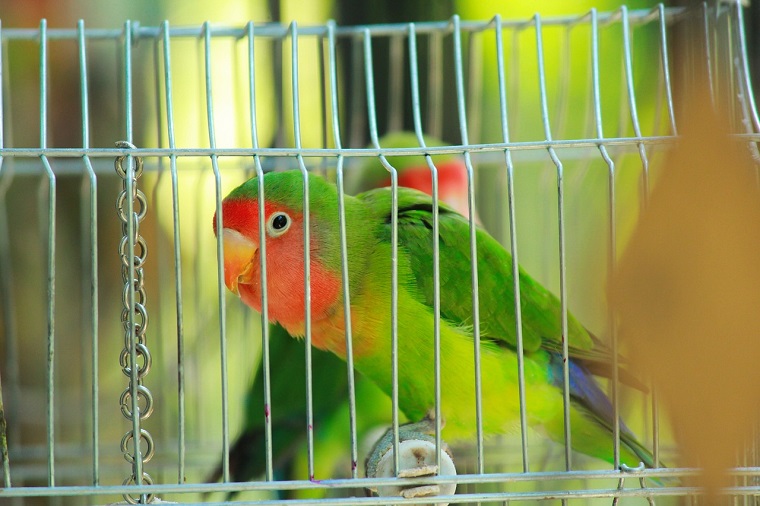
- Parrots range from tiny parakeets to Quakers, large cockatoos and macaws.
- Parrots can imitate sounds, including human speech.
- Parrots need plenty of toys and mental stimulation to keep them entertained, otherwise they may become bored or destructive.
- Parrots have excellent memories and can remember words and phrases that they hear regularly.
- Parrots like to play with toys and explore their environment.
- Parrots need to have daily interaction with their human companions in order to stay healthy and content.
- Parrots can sometimes be territorial and aggressive towards other animals, so caution should be taken when introducing any new pet into the home.
- It’s important for parrot owners to research the specific needs of their bird before bringing it home. Each species of parrot has different dietary, behavioral and health requirements.
- To prevent accidents in the home, parrots should be kept in an enclosed area with plenty of toys to keep them busy.
- Parrots are colorful birds with a variety of shapes and sizes. They can be found all over the world, from tropical rainforests to deserts.
- Parrots are playful and can be taught a variety of tricks.
- Parrots need lots of love, attention and care in order to stay healthy and happy.
- Parrots are social animals and will bond with their owners if given the chance.
- Parrots need a lot of space to fly around and explore, so they should be housed in large cages or aviaries.
- Parrots require daily care and attention and they will reward their owners with companionship, laughter and joy.
- With the right environment and care, parrots can make wonderful pets that provide years of entertainment and love.
13 facts about parrots’ diet
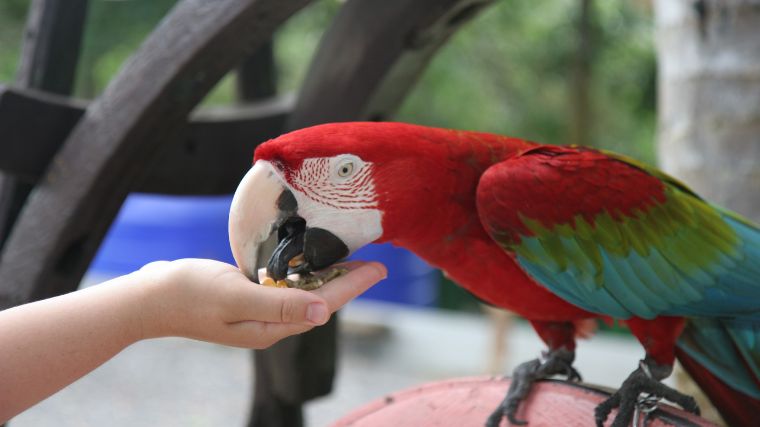
Here are 13 facts you must know about the diet of parrots.
- Parrots need a healthy diet to stay active, both physically and mentally.
- Parrots need a healthy diet of fresh fruits, vegetables and pellets.
- Proper diet is also very important for parrots – they should have access to a variety of fresh fruits and vegetables, as well as a nutrient-rich parrot food.
- Parrots need a balanced, healthy diet to maintain their health and energy levels.
- A varied diet is important for parrots; they should be offered an assortment of fresh fruits and veggies, as well as seeds and nuts.
- Commercial formulated diets are also available for parrots, which provide them with the proper nutrients and vitamins that they need.
- A diet of only sunflower or other single-ingredient seeds can cause malnutrition in parrots, so it’s important to provide different types of foods.
- Parrots should have access to fresh water at all times to stay hydrated.
- Parrots require special care and attention, so it’s important to take the time to learn about their needs.
- A good quality cage is necessary for a pet parrot; it should be large enough to provide ample space for exercise and activities.
- Grooming is also important to keep parrots healthy; they should be provided with bird baths or showers, as well as nail trimming and wing clipping if necessary.
- Ultimately, parrots make wonderful pets and bring a lot of love and joy into our lives – if we are willing to give them the care and attention they need!
15 Facts about beak of Parrots
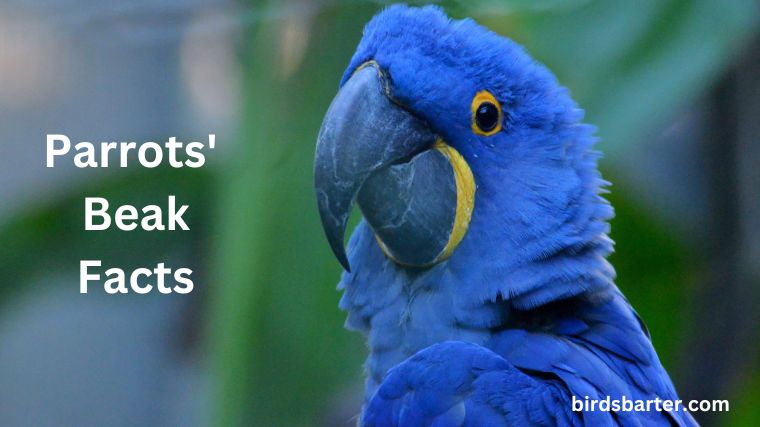
Here are some interesting facts about parrots’ beak.
- Parrots have strong beaks that allow them to crack open nuts and other hard foods.
- Parrots use their beaks for eating, climbing and preening feathers.
- The upper mandible of a parrot’s beak is typically shorter than the bottom one, creating a slight hooking effect from side to side.
- Depending on the species, parrot beaks are typically black, grey or yellow in color.
- Beaks of parrots can be smooth and hard or textured with ridges and grooves to help them grip food more easily.
- Parrot beaks grow continuously throughout the bird’s lifetime, similar to human nails or hair.
- The hardness of a parrot’s beak is determined by the food it eats. A diet rich in calcium and other minerals helps keep its beak hard, while a lack of these nutrients can cause the beak to become soft and brittle.
- Parrots use their beaks to play, chew on objects and toys, explore their surroundings and defend themselves from predators.
- Parrots also use their beaks for grooming purposes such as preening feathers or cleaning their eyes and nostrils.
- Parrots are renowned for their ability to mimic speech and sounds with great accuracy – mainly due to the structure of their beaks which allows them to manipulate sound waves better than most other birds.
- Parrots also have a keen sense of vision, allowing them to spot potential predators and other threats from distances. They have excellent peripheral vision that helps them detect movement in all directions.
- Parrot owners should provide their pet with a variety of perches, toys, and activities to keep the bird mentally stimulated and entertained. This can help prevent boredom-related behaviors such as feather plucking and screaming.
- Parrots love to chew on things which is why they need lots of safe objects like wooden or cardboard blocks, branches and logs for them to explore and exercise their beaks on!
- All parrots need access to fresh water throughout the day; some species may even enjoy taking baths.
- Parrots require yearly vaccinations to help protect them from disease.
What is a parrot?
Parrots are a type of bird found mainly in tropical and subtropical regions. Parrots come in more than a hundred of species and varieties of parrots. They have curved beaks and talons for gripping onto branches or prey, as well as bright feathers which serve for display purposes such as courtship and communication. Parrots are known for their intelligence, especially their ability to mimic sounds and words. They use this skill to communicate with each other and with people. Parrots can also learn tricks such as stepping up on a perch or playing games.
What do parrots do?
Parrots are incredibly entertaining animals that can provide endless hours of entertainment and companionship. They are capable of learning numerous words and phrases, as well as songs.
Some parrots even learn tricks like waving or clapping their wings! Parrots also love to be around people and will often seek out human interaction when given the opportunity. With regular socialization, parrots develop strong bonds with their owners, making them excellent long-term companions.
Parrot owners can also have fun teaching their feathered friends new skills through positive reinforcement training methods.
In addition to providing mental stimulation for their owners, parrots can make great physical exercise partners too! Many parrot species enjoy playing chase games or flying from one spot to another in their home.
Regular exercise helps keep parrots fit and healthy, as well as allowing them to express natural behaviors. Keeping a parrot can be an incredibly rewarding experience for both the owner and the bird.
With proper care, socialization, training and exercise, a parrot can become a beloved member of your family!
Before taking on the responsibility of owning a pet parrot, however, make sure you have done your research and are ready to provide your feathered friend with everything they need to thrive.
Why are they so popular as pets?
Parrots are popular as pets for many reasons. They are beautiful and colorful, so they make for a visually stunning addition to the family. They can be great companions and can form strong bonds with their owners. Parrots have been known to mimic sounds and even speak words or phrases, making them fascinating creatures to interact with.
Additionally, parrots can learn tricks, providing an entertaining way to interact with them. They also require plenty of attention and stimulation, so they are not ideal for people who are looking for a low-maintenance pet. However, for those willing to give their parrot the care and attention it needs, it can be a very rewarding experience.
Helpful. Thank you.